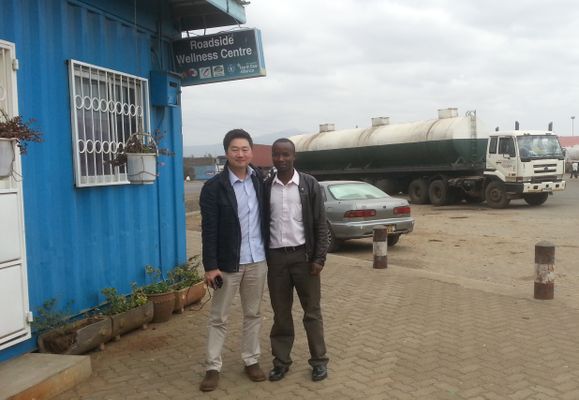I arrived in Nairobi, Kenya in mid-June to work with North Star’s East Africa regional office to improve supply chain management of medicine and medical supplies so that North Star can provide effective and continuous care to their patients. The North Star East Africa regional office is located in Karen, 20 km (12 miles) south of Nairobi’s city center and has nine full-time employees. Since arriving I have had the chance to meet and work with a number of the North Star staff members such as Eva, the regional director and key supporter of my project, Eston, the program coordinator, and Samuel the information and communication technology officer who manages COMETS, North Star’s proprietary electronic health records technology, and its data output, both core strengths of North Star’s model.

Above: Wonjae at the Maai Mahiu Roadside Wellness Center (RWC) with the clinical officer in charge of treating patients and managing the center. You can see the blue box shipping container repurposed as a RWC, trucks parked, and lodges for truck drivers.
For my project I have visited a number of the North Star RWCs and learned a great deal about the challenges surrounding inventory and supply chain management.
The RWC in Maai Mahiu RWC is representative of a typical RWC in the North Star network. It has three rooms: a consultation room, a waiting room, and a HIV testing and counseling room with a trained counselor. This particular RWC serves truck drivers who transport goods from Kenya to Rwanda and Uganda. Near the clinic, there is a large parking area and lodges to accommodate truck drivers. Since truck drivers work different hours than the general population, each RWC adjusts their hours according to the resting hours of their target population. This particular RWC opens at 2 PM. Still, Steven, the clinician and site coordinator, came in early to welcome us and share the inventory and supply chain management challenges he faces that have helped inform my project. As a doctor myself, we also discussed best practices surrounding diagnosis and treatment. Steven was very knowledgeable about medicine and passionate about his patients. I am sure that the patients are in good hands.

Above: A map of ‘hot spots’ around the clinic that tells you the number of truck drivers and sex workers at each of the lodges on any given day.
I also visited the Mlolongo RWC located on the outskirts of Nairobi on a highway that leads to Mombasa, a city on Kenya’s coast. The Mlolongo RWC is unique because it operates in partnership with the local county government who allocates nurses to provide health care for children from the local community in collaboration with North Star. The local government even cleared the area so that the RWC could provide better access to key services for transient and under-served populations. I even had the chance to meet a sex worker at the North Star clinic who volunteers with North Star to educate her colleagues about health issues and provide outreach services to others in the target population. In fact, I learned that it is sex workers who play a crucial role in bringing in truck drivers to the RWC to get HIV testing and counseling as they often develop a regular relationship with the driver and can bring up the topic more naturally.
In the two weeks I have been here I have seen how North Star staff members work hard to create impact where there is traditionally limited opportunity for positive change. Staff members in the regional office are passionate and strategic about their work, searching to make the biggest impact with the resources they have available. Everyone from volunteers to clinicians strive to improve health on the front lines. It is this passion for continuous improvement that I believe will allow North Star to continue providing high-quality health care services and expand their reach to people who are still in need. I hope to contribute to North Star’s mission of providing patients with effective, continuous health care by providing guidance for the development and implementation of an efficient supply chain management strategy.

